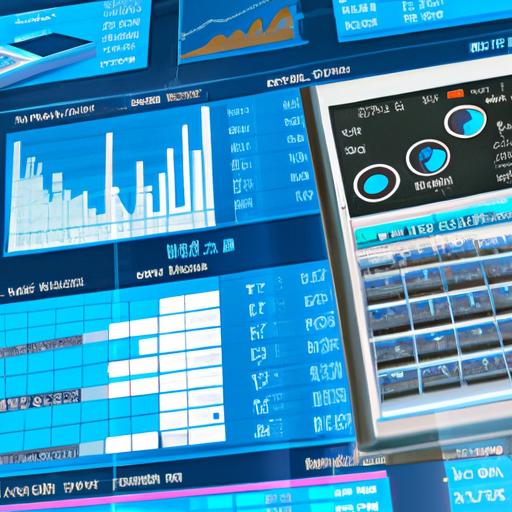What is Accounting Software: Simplifying Financial Management for Businesses
Introduction to Accounting Software
In today’s fast-paced business world, managing financial records and transactions efficiently is crucial for the success of any company. This is where accounting software comes into play. But what exactly is accounting software, and why is it so important for businesses?
Definition of Accounting Software
Accounting software refers to a digital tool or application that helps businesses automate and streamline their financial tasks, including bookkeeping, invoicing, payroll management, tax calculations, and financial reporting. It acts as a centralized hub that simplifies complex financial processes, allowing businesses to stay organized and make informed decisions.
Importance and relevance of accounting software in businesses
Accounting software plays a vital role in managing a company’s financial health. It provides businesses with real-time insights into their financial data, enabling them to track income, expenses, and cash flow effectively. This software eliminates the need for manual calculations and paperwork, reducing human errors and saving valuable time.
Moreover, accounting software offers businesses the ability to generate accurate financial reports, such as balance sheets, profit and loss statements, and cash flow statements. These reports provide a comprehensive overview of the company’s financial standing, aiding in financial planning, budgeting, and forecasting.
Accounting software also facilitates compliance with tax regulations by automating tax calculations and generating tax forms. This ensures businesses meet their tax obligations accurately and on time, avoiding penalties and legal complications.
In summary, accounting software is a powerful tool that simplifies financial management for businesses. By automating tasks, providing real-time insights, and ensuring accuracy, it empowers companies to make informed financial decisions and maintain a strong financial position.
Stay tuned for the upcoming sections, where we will delve deeper into the key features, types, benefits, and factors to consider when choosing accounting software. Let’s unlock the potential of accounting software together!
Key Features of Accounting Software
In the fast-paced world of business, efficiency and accuracy are paramount when it comes to financial management. Accounting software provides a range of powerful features that streamline financial processes, making them more efficient and error-free. Let’s explore some of the key features offered by accounting software and how they contribute to the success of businesses.
Overview of the main features offered by accounting software
1. Bookkeeping Automation: One of the primary functions of accounting software is automating bookkeeping tasks. From recording transactions to categorizing expenses and incomes, accounting software simplifies the process, reducing manual errors and ensuring accurate financial records.
2. Invoicing and Billing: Generating professional invoices and managing billing becomes a breeze with accounting software. It enables businesses to create customized invoices, track payment statuses, and automate reminders, ensuring timely payments and improving cash flow management.
3. Financial Reporting: Accounting software offers robust reporting capabilities, providing businesses with real-time insights into their financial performance. From balance sheets to profit and loss statements and cash flow reports, these tools generate comprehensive reports that aid in decision-making and financial planning.
4. Inventory Management: For businesses that deal with physical products, accounting software often includes inventory management features. It allows businesses to track stock levels, manage purchases and sales, and generate reports to optimize inventory management and prevent stockouts or overstocking.
Explanation of how these features streamline financial processes
By incorporating these key features, accounting software streamlines financial processes and brings numerous benefits to businesses. Firstly, automation reduces manual data entry and minimizes human errors, ensuring accurate financial records and reports.
Secondly, the ability to generate professional invoices and track payments improves cash flow management. It helps businesses stay on top of outstanding payments, reducing late payments, and improving overall financial stability.
Thirdly, real-time financial reporting provides businesses with valuable insights into their financial health. By having access to up-to-date financial data, businesses can make informed decisions, spot trends, and identify areas for improvement.
Lastly, inventory management features optimize stock levels, reducing the risk of stockouts or overstocking. This not only improves operational efficiency but also helps businesses manage their cash flow effectively by avoiding tying up capital in excess inventory.
In conclusion, accounting software offers a range of key features that automate financial processes, improve accuracy, and provide valuable insights. These features contribute to the overall success and financial stability of businesses. In the next section, we will explore the different types of accounting software available in the market. Let’s dive in!
Types of Accounting Software
When it comes to accounting software, there are various categories available in the market, each catering to specific business needs. Let’s explore the different types of accounting software and their functionalities:
1. Desktop Accounting Software
Desktop accounting software is installed on a local computer or server and operates offline. It offers robust features and allows businesses to have complete control over their financial data. This type of software is ideal for businesses that prefer on-premises solutions and have limited internet connectivity.
2. Cloud-based Accounting Software
Cloud-based accounting software operates online, with data stored in the cloud. It provides businesses with the flexibility to access their financial information from any device with an internet connection. Cloud accounting software offers real-time collaboration capabilities, automatic updates, and seamless integrations with other business tools. It is suitable for businesses that value mobility and scalability.
3. Small Business Accounting Software
Small business accounting software is specifically designed for small and medium-sized enterprises (SMEs). It offers essential features such as invoicing, expense tracking, and basic financial reporting. This type of software is user-friendly, cost-effective, and ensures SMEs can efficiently manage their finances without complex functionalities.
4. Enterprise Accounting Software
Enterprise accounting software caters to the needs of large organizations with complex financial operations. It offers advanced features such as multi-currency support, project accounting, inventory management, and more. Enterprise software is highly customizable and scalable, allowing businesses to handle their accounting processes efficiently, even at a large scale.
5. Industry-Specific Accounting Software
Some accounting software solutions are tailored for specific industries, such as construction, healthcare, or retail. These industry-specific software options offer specialized features and integrations that suit the unique requirements of those sectors. They streamline industry-specific processes, ensuring accurate financial management and compliance within the respective industries.
By understanding the different types of accounting software available, businesses can choose the one that aligns with their specific needs and goals. Whether it’s a desktop solution for offline operations, a cloud-based platform for remote access, or an industry-specific software for streamlined workflows, accounting software provides a tailored approach to financial management. In the next section, we will discover the incredible benefits of implementing accounting software in businesses.
Benefits of Accounting Software
As businesses strive for growth and success, utilizing accounting software offers numerous advantages that can significantly impact their financial management. Let’s explore some key benefits that make accounting software an essential tool for businesses.
Increased Accuracy
Manual bookkeeping and financial calculations are prone to human errors, which can lead to costly mistakes. Accounting software automates these processes, reducing the risk of errors and ensuring accuracy in financial data. By eliminating manual data entry and calculations, businesses can rely on precise figures, minimizing the chances of miscalculations or discrepancies.
Enhanced Efficiency
Accounting software streamlines financial processes and eliminates time-consuming manual tasks. With features like automated bank reconciliations, invoice generation, and expense tracking, businesses can handle their financial operations more efficiently. This allows employees to focus on strategic tasks rather than being bogged down by tedious administrative work.
Time-Saving Aspects
Time is a valuable resource for businesses, and accounting software helps save significant time in managing finances. The automation of tasks, such as generating reports, processing payroll, and preparing tax documents, accelerates the financial management process. This time-saving aspect allows businesses to allocate their resources to other critical areas of operation, promoting productivity and growth.
Improved Financial Decision-Making
Accurate and up-to-date financial data provided by accounting software empowers businesses to make informed decisions. With real-time insights into cash flow, revenue, and expenses, businesses can identify trends, forecast future financial scenarios, and make data-driven decisions. This enables them to optimize resource allocation, identify areas of improvement, and seize growth opportunities.
Enhanced Financial Reporting
Accounting software simplifies the generation of financial reports, providing businesses with comprehensive overviews of their financial performance. From balance sheets to profit and loss statements, these reports offer insights into the company’s financial health, enabling better financial planning and analysis. This transparency aids in identifying potential risks, monitoring profitability, and demonstrating financial stability to stakeholders.
In conclusion, accounting software offers a multitude of benefits to businesses. From increased accuracy and efficiency to time-saving aspects and improved financial decision-making, the advantages of utilizing accounting software are undeniable. Stay tuned as we explore the different types of accounting software in the next section and discover the best fit for your business.
Factors to Consider When Choosing Accounting Software
When it comes to selecting the right accounting software for your business, there are several important factors to consider. Let’s explore these crucial considerations before making a decision:
Compatibility
Before investing in accounting software, it’s essential to ensure compatibility with your existing systems and processes. Check if the software integrates seamlessly with your current financial management tools, such as payroll systems or inventory management software. Compatibility ensures smooth data flow and eliminates the need for manual data entry or duplicate efforts.
Scalability
As your business grows, so will your financial needs. It’s vital to choose accounting software that can scale alongside your business. Consider the software’s ability to handle a larger volume of transactions, additional users, and increased complexity. Scalable software will save you the hassle of switching to a new system as your business expands.
Cost
Budget is a crucial factor when selecting accounting software. Determine your budget and evaluate the pricing models offered by different software providers. Some software options require a one-time payment, while others have a subscription-based model. Consider the features offered in each pricing plan and choose the one that aligns with your budget and requirements.
User-Friendliness
Accounting software should be user-friendly, especially if you or your team members are not accounting experts. Look for intuitive interfaces, easy navigation, and a user-friendly design. The software should offer clear instructions, tooltips, and customer support to ensure a smooth user experience. A user-friendly interface will save time and reduce the learning curve for your team.
Considering these factors will help you make an informed decision when choosing accounting software for your business. Keep in mind that every business has unique needs, so it’s essential to assess these considerations based on your specific requirements. The right accounting software will streamline your financial processes and contribute to the overall success of your business.
Next, let’s explore some popular accounting software solutions in the following section.
Popular Accounting Software Solutions
When it comes to choosing the right accounting software for your business, there are numerous options available in the market. To help you make an informed decision, let’s take a closer look at some of the popular accounting software solutions:
-
QuickBooks: QuickBooks is one of the most widely used accounting software platforms, offering a range of features suitable for small to medium-sized businesses. It provides tools for invoicing, expense tracking, inventory management, and financial reporting. QuickBooks is known for its user-friendly interface and robust integrations with other business applications.
-
Xero: Xero is another prominent accounting software solution that caters to small businesses and freelancers. It offers features such as bank reconciliation, invoicing, payroll management, and project tracking. Xero’s cloud-based platform allows users to access their financial data from anywhere, making it convenient for businesses on the go.
-
Zoho Books: Zoho Books is an accounting software solution suitable for small businesses and startups. It offers features like invoicing, expense tracking, bank reconciliation, and inventory management. Zoho Books also integrates seamlessly with other Zoho applications, providing a comprehensive suite of business tools.
-
Wave: Wave is a free accounting software option that caters primarily to freelancers, consultants, and small businesses. It offers features like invoicing, expense tracking, and receipt scanning. Wave’s affordability and simplicity make it an attractive choice for those just starting out or with limited budgets.
-
Sage Intacct: Sage Intacct is a robust accounting software solution designed for mid-sized to large businesses. It provides advanced features such as multi-entity and multi-currency management, financial consolidation, and revenue recognition. Sage Intacct offers scalability and customization options to meet the specific needs of growing organizations.
These are just a few examples of the accounting software solutions available in the market. Each has its own strengths and caters to different business sizes and requirements. It’s important to evaluate your business needs, consider the features offered, and read customer reviews before making a decision.
In conclusion, accounting software plays a vital role in streamlining financial management for businesses. By leveraging popular accounting software solutions like QuickBooks, Xero, Zoho Books, Wave, or Sage Intacct, you can simplify your financial processes and gain valuable insights into your company’s financial health.
Stay tuned for more informative articles on accounting software and its benefits.






